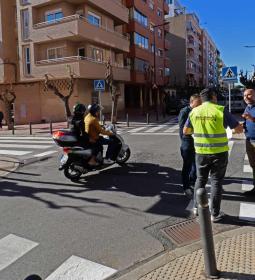Meetings have been held with establishments that rent self-propelled wheelchairs and with tourist associations
Mobility intensifies control over the rental and use of personal mobility vehicles

The Department of Mobility, hand in hand with the Local Police, has intensified control over the rental and use of personal mobility vehicles in Benidorm. To this end, “a campaign has been deployed that operates along two lines: on the one hand, to inform the establishments that are in charge of renting these vehicles what the municipal ordinance establishes and to check its compliance; and on the other, to do the same with the users”, as reported by the councillor for the area, José Ramón González de Zárate.
The mayor recalled that "Benidorm was one of the first municipalities in Spain to regulate the rental and circulation of this type of vehicle and translate it into a municipal ordinance, to order the use of these new vehicles with the greatest security guarantees for all road users, mainly pedestrians.
"Despite everything -he added-, there are those who do not comply, which generates complaints from drivers and many pedestrians who suffer from the excessive speed of these vehicles or their circulation through spaces that they should not, putting other users at risk and also generating damage to the pavement of sidewalks and walks”. Hence, "to tackle this circumstance, this information campaign has been deployed on these vehicles, mainly self-propelled wheelchairs and electric scooters."
As detailed, "meetings have been held with the establishments dedicated exclusively to the rental of this type of vehicle and also with the associations of hotels, tourist apartments and campsites so that, in turn, they transfer all the information to the establishments that offer its clients to rent self-propelled wheelchairs”.
In these meetings, establishments have been reminded that “the ordinance establishes that the rental of these self-propelled wheelchairs is limited to people with proven mobility problems, with disabilities or who are over 55 years of age; and they have also been reminded of the sanctions faced by those who fail to comply with the regulations and that can reach 500 euros”.
In parallel, on public roads, "the Local Police is in charge of informing and reminding users of the content of the ordinance, emphasizing where these vehicles can circulate and the speeds at which they can do so, and informing them that the More serious offences can carry fines of up to 500 euros.
In this sense, the ordinance generally prohibits these vehicles from driving on sidewalks, except in the cases of people with reduced mobility or functional diversity who may do so at a maximum speed of 4 kilometres per hour, the equivalent of the speed of pedestrians.
These personal mobility vehicles cannot circulate on the bike lanes located on the sidewalks either, but they can circulate on those that run along the road. In the streets with a single platform where the passage of vehicles is authorized, they may circulate at a maximum speed of 20 kilometres per hour, as they may also do so on the road, respecting that same speed; while only the smallest skates can travel through the parks.
In addition, all users of this type of vehicle are required to wear a helmet and have civil liability insurance.
"We want the use of these personal mobility vehicles, which have proliferated so much in cities, not to cause problems and that chairs and scooters coexist in harmony with the rest of the users," said the mayor.














